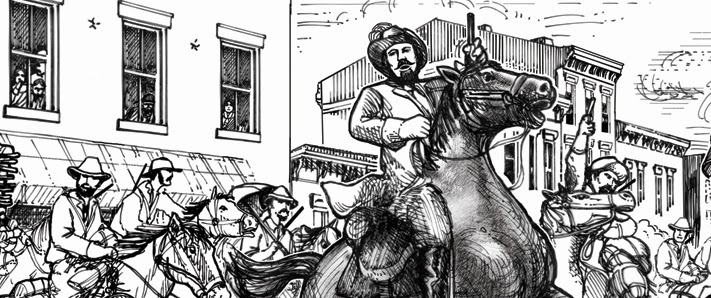JUNE 9, 1864:
The Battle of Old Men and Young Boys (The First Battle of Petersburg):
What becomes the Siege of Petersburg, Virginia begins even while Grant and Lee are engaged in the trenches at Cold Harbor. General Benjamin “Beast” Butler U.S.A’s Army of The James makes a foray toward Petersburg. Butler finds the complex entrenchments around the city manned by a single Brigade of Virginia State Militia made up of adolescents and men in their sixties. Amazingly, the old men and young boys drive Butler’s troops off. The Union troops return all the way to their base in The Bermuda Hundred.
The Battle
of Old Men and Young Boys has two results. First, it makes Grant question
Butler’s competence and will to fight (both already under scrutiny).
Second, it alerts the Confederates as to just how weak the Petersburg defenses
really are. Lee begins sending reinforcements to Petersburg almost literally at
the moment that Grant decides to bypass Richmond and take lightly-defended
Petersburg instead. In the end, Butler’s staggering ineptitude in fighting a
token force undoubtedly lengthens the war.
The Battle
of Cold Harbor (Day Ten):
The
brutal fire across No-Man’s Land continues. Both Lee and Grant are sacrificing
men every day just to stay in place. Robert E. Lee is chafing under these
conditions. He realizes that an all-out attack on the Union entrenchments will
end in a bloody Confederate debacle identical to the Union’s June 3rd
disaster, and that such a debacle will spell the end the war. The Union will be
victorious.
Lee also knows
in his gut that the Union Army must be stopped here and now or probably
not at all. Lee says: “We must destroy this army of Grant’s before he gets to
the James River. If he gets there, then
it will be a siege, and then it will be a mere question of time.”
Lee faced
this same dilemma in 1862. Cold Harbor is hard by Gaines’ Mill where he and
McClellan had battled it out in that seemingly long-ago summer. McClellan had
retreated practically to Paris after Lee had handed him a stinging but mild
defeat. Grant is not McClellan. Grant seems only to gain more resolve from each
setback. Lee knows he is facing a different kind of enemy now. And Lee knows he is being backed into a
corner, however it looks.
In 1864,
the battlefield positions of the Union and Confederate forces are exactly
reversed from those of 1862.
 |
| Old Cold Harbor Inn |
Interestingly,
neither Cold Harbor --- Old or New --- is a harbor, and neither has water
access. The word “harbor” is used here in its older sense as “a place of
shelter” or a “hold” (as in “harboring a grudge”). The “Harbors” were two inns
owned by Isaac Burnett, who, innkeeper though he was, was not known for his
bonhomie in either his older establishment or his newer.
As was
common in those days, small crossroads towns had grown up around the two inns,
and now a complex of trenches stretched between them.
 |
| This aerial photograph of the trenches on the 1916 Western Front in World War I gives some idea of the appearance of the countryside around Cold Harbor in 1864 |
The dead
are buried underfoot or in shallow graves along the margins of No-Man’s Land.
The Spring rain washes the remains out of their uneasy resting places making
the already macabre battlefield a place of searing nightmares.
 |
| The exhumed dead at Cold Harbor |

